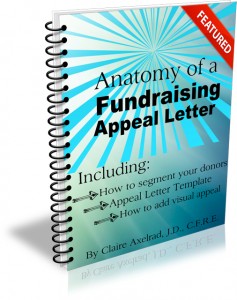 Today I’m going to tell you how to create a fundraising appeal that’s all about your donor’s happiness.
Today I’m going to tell you how to create a fundraising appeal that’s all about your donor’s happiness.
Because if you can persuade your donor that saying “yes” will make them happy, then you both win.
Don’t you want to make your donor feel like a winner?
Don’t you want to be a winner?
Everybody wants to be a winner!
Sadly, most nonprofits write appeals that don’t create a win/win.
They write self-congratulatory letters that talk about how wonderful they are, and what wonderful outcomes they make possible.
They forget about the donor.
They don’t think about donor joy.
How can I be so certain this is the case?
A majority of donors are not happy.
They are so dissatisfied with their giving experience that one in five first-time donors never give again. And less than a majority of all donors repeat their giving.
Perhaps you’re an exception. Do you know your donor retention rate? If it’s less than 50% overall, you’re failing your supporters.
It’s up to you to make your donor feel abundantly appreciated – before and after they give. Giving isn’t always its own reward.
We talk a lot about showering donors with gratitude after they give. And this is important.
But the loving begins with what you say in your appeal.
I mean it! Your fundraising appeal is an opportunity to give your donor, or would-be donor, a warm glow.
If you doubt this, there’s actually research to back up the “warm glow” theory of fundraising.
Here’s one experiment I like.
An A/B test email went to Alaska residents, asking them to donate to a state charitable fund. There were two versions:
- Make Alaska Better
- Warm your heart
The inference from the first message was it’s a good thing to do for the community. The inference from the second was it will make you feel good.
The Warm your heart message significantly outperformed the “Make Alaska Better” message, with 30% more people giving to the cause along with gift amounts that were 55% higher! That’s a pretty convincing difference.
I can’t think of more persuasive evidence that it’s worth your effort to focus on making your donors happy.
Donors want to know they’re your hero.
What could possibly make your donor happier than knowing they’re saving the day… righting a wrong… ending suffering… creating beauty… restoring hope… doing something critically important that wouldn’t otherwise get done?
What could create more joy for donors than knowing they’re super special human beings – and you recognize, and are extraordinarily grateful, for that?
Could you write a fundraising appeal that makes your donor the hero of your story?
Because that’s what your appeal should do. Tell a story.
- One story that narrates the tale of a protagonist (person, place or thing) your donor can empathize with.
- One story that describes the challenges the protagonist faces, and how they fight like heck to overcome them but the odds are stacked against them or fate intervenes in an unkind way.
- One story that gives your supporter the opportunity to swoop in and be… the HERO.
Ignite your donor’s passion to be a Super Hero!
Your donor wants to give the story a happy ending.
Too often, fundraising appeals don’t give them this opportunity.
There’s no thrilling story. Just a litany of bad news and dull writing:
Last year we served over 20,000 people through our 11 offices in five counties with early intervention and prevention services. We expect even more to turn to us for help this year. Will you give to help at-risk children have a better life?
OR
We have always been committed to rigorous financial management. Today we’re even more careful about our resources. That’s why we want to report to you that, though individual giving has been gratifying, we nonetheless must maintain a great deal of vigilance. We appeal to you to once again demonstrate your commitment.
O.M.G.
I hope you can see what’s wrong with these two (sadly, real) examples.
Can you write a better appeal?
Take a look at your last appeal letter.
Is it inspiring?
How does it make you feel?
The best appeals make the reader feel not only that they must act, but they make the reader really EXCITED at the prospect of making a difference.
And guess what really thrills people?
Knowing that if they give you’ll be over the moon grateful.
So… tell them now!
Make gratitude a star of your appeal.
People like to feel valued and appreciated. It makes them happy!
Saying thank you in your appeal has a dual purpose.
- For folks who’ve given before, reminding them how grateful you are for their past giving inclines them to want to repeat this behavior. This is due to one of Cialdini’s six principles of influence “commitment and consistency.” Once people commit to an idea or goal, they’re more likely to follow through – and continue to do what they’ve already done.
- For folks who’ve yet to give, thanking them in advance is a type of flattery. It shows you assume they are kind, caring and generous. We all respond to flattery.
The simplest way to incorporate gratitude is just to say “thank you.”
How else might you do it?
“You make it possible.”
“This couldn’t be done without you.”
“This work completely depends on you.”
“Your compassion means the world.”
“Your heroism is what will pull people through.”
“I speak to your generous heart, and your abundant caring.”
 You get the idea.
You get the idea.
Go ahead and gush. It will be appreciated, I promise you.
We’ve all wanted to be super heroes since we were little kids. It doesn’t change just because we grow up.
Remember: Your goal is to make your donors happy. To help them fulfill their dreams. Their goal is to make those who depend on you, similarly happy and fulfilled.
It’s a joyful, life-affirming win/win.
Make this Year’s Annual Giving Appeal Your Best Ever

This newly revised 62-page e-Guide is a surprisingly quick read — and a true road map to creating a winning fundraising appeal
Having trouble knowing where to begin? Could your appeal use a shot in the arm? You may find my Anatomy of a Fundraising Appeal Letter plus Sample Template helpful. This step-by-step guide to crafting a killer appeal letter or email appeal will help you take your appeal from colorless to captivating. I guarantee you’ll raise more money if you follow these guidelines.
To your success!
Photos by Steven Libralon and Jessica Podraza on Unsplash





